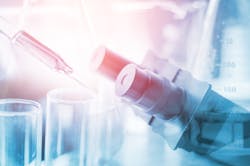Researchers from the School of Science at Indiana University-Purdue University Indianapolis are developing a new biosensor with the potential to achieve the speed and efficiency required for the future of COVID-19 testing.
The work was recently reported in Applied Materials & Interfaces, a journal of the American Chemical Society. It is led by Rajesh Sardar, a professor of chemistry and chemical biology in the School of Science, and Adrianna Masterson, a graduate student in Sardar's lab at the time of the study.
In terms of speed, the COVID-19 test from Sardar's lab can currently analyze samples from 96 individuals in under three hours, he said. In terms of efficiency, the system requires only 10 microliters of blood. By comparison, a typical blood panel order by a primary-care physician collects 10 milliliters of blood -- over 1,000 times more.
The sensor also works with other sample types, such as saliva, Sardar said. But the study was conducted using blood since it's the most complex bodily fluid and therefore the best indicator of a sensor's accuracy. All test samples were obtained from the Indiana Biobank, which provided 216 blood samples: 141 samples from patients with COVID-19 and 75 healthy control samples.
Based upon a blind analysis, IUPUI researchers found their biosensor's accuracy rate was 100 percent and its specificity rate was 90 percent. In other words, the sensor never reported a false negative and only reported a false positive in 1 out of 10 samples. For the purposes of public safety, Sardar said, the absence of false negatives is more important than false positives, because a person with a false negative may unknowingly infect others, whereas a person with a false positive is not a danger.
Additionally, Sardar said the sensor was found to be highly accurate at measuring the body's COVID-19 antibody concentration. This is because it detects not only the virus's spike protein but also the proteins created by the body to protect against the virus -- immunoglobin G, or IgG.
He also said the ability to measure COVID-19 antibodies is significant because many COVI9-19 antibody tests currently approved under the FDA's emergency use authorization don't provide specific antibody counts, despite the fact that this number indicates the strength of a person's immunity to infection.
To achieve its results, Sardar's lab's biosensor uses chemically synthesized gold triangular nanoprisms, which provide a uniquely powerful optical response to even minuscule amounts of IgG. It also means the sensor can detect antibodies in the earliest stages of infection.

